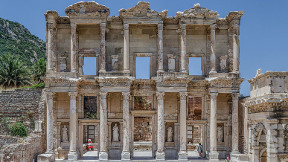|
|||||||||||||||||||||||||||||||||||||||||||||||||||||||||||||||||||||||||||||||||||||||||||||||||||||||||||||||||||||||||||||||||||||||||||||||
|
|||
|
|||
The story of the rich man and his question to Jesus of “what must I do to inherit eternal life?” is often described as one where the result is the man kept his possessions and ended in hell. This will be a review of the text and an argument for the opposite conclusion. The story is found starting in Matthew 19:16, Luke 18:18 and the one we quote below in Mark 10:17 (ESV). 17And as he was setting out on his journey, a man ran up and knelt before him and asked him, “Good Teacher, what must I do to inherit eternal life?” 18And Jesus said to him, “Why do you call me good? No one is good except God alone. 19You know the commandments: ‘Do not murder, Do not commit adultery, Do not steal, Do not bear false witness, Do not defraud, Honor your father and mother.’” 20And he said to him, “Teacher, all these I have kept from my youth.” 21And Jesus, looking at him, loved him, and said to him, “You lack one thing: go, sell all that you have and give to the poor, and you will have treasure in heaven; and come, follow me.” 22Disheartened by the saying, he went away sorrowful, for he had great possessions. 23And Jesus looked around and said to his disciples, “How difficult it will be for those who have wealth to enter the kingdom of God!” 24And the disciples were amazed at his words. But Jesus said to them again, “Children, how difficult it is to enter the kingdom of God! 25It is easier for a camel to go through the eye of a needle than for a rich person to enter the kingdom of God.” 26And they were exceedingly astonished, and said to him, “Then who can be saved?” 27Jesus looked at them and said, “With man it is impossible, but not with God. For all things are possible with God.” 28Peter began to say to him, “See, we have left everything and followed you.” 29Jesus said, “Truly, I say to you, there is no one who has left house or brothers or sisters or mother or father or children or lands, for my sake and for the gospel, 30who will not receive a hundredfold now in this time, houses and brothers and sisters and mothers and children and lands, with persecutions, and in the age to come eternal life. 31But many who are first will be last, and the last first.” We should not brush over the first response of Jesus: “Why do you call me good? No one is good except God alone.” Jesus is speaking. Jesus is God. Therefore Jesus is essentially saying “No one is good except me.” So why would Jesus ask “Why do you call me good?” The rich man did not have the context of the Gospel accounts to understand this, but we do. On the other hand he was knelling before Jesus and saw Him face-to-face. Perhaps he knew more than we assume. Some Moslem commentators take this to mean that Jesus is denying that He is God. However, Jesus often used rhetorical questions. For example Matthew 16:8 (“But Jesus, aware of this, said, "O you of little faith, why are you discussing among yourselves the fact that you have no bread?”), and Matthew 22:18 (“But Jesus, aware of their malice, said, "Why put me to the test, you hypocrites?”), are two examples where Jesus was “aware” of what the listeners were thinking. The question was not for His benefit, but for ours. When He said “Why do you call me good?” it could be argued to mean: you acknowledge I’m good, only God is good, therefore you acknowledge I am God. It is easy to lambast the man for his statement in verse 20: “Teacher, all these I have kept from my youth.” It may be reaching out of context to point out that the man in actuality has sinned in all these areas, as described by Jesus in Matthew 5. Jesus quoted directly from the Decalogue and not any statement of the Matthew 5 flavor. Jesus’ reaction was not to condemn the man that he had murdered in his heart, but rather to add “You lack one thing”. Perhaps we could read into the account grace toward the man who may not have had the understanding of sin from the Gospel perspective. When Jesus said to “sell all that you have and give to the poor” he put a challenge before the man that any one of us would have had reacted strongly. The first items Jesus mentioned were commands to us all. Sell all was a specific challenge that is beyond the commandments. It is not a sin to be rich or Kings David and Solomon would be condemned. It seems the man was looking to the law for his salvation. Instead Jesus was challenging his heart. Are the Jews of Jesus’ day who looked to the law any different from the 21st century Americans who change the words but do the same? Do we cling to our doctrine that makes our denomination so much better than others, or do we offer Jesus to a “broken spirit; a broken and contrite heart” (Psalm 51:17)? We need to understand the attitudes of people in the first century. To do so we just need to look in a mirror. No matter what material wealth we have, how many of us are willing to follow through on this idea? If you live in a nice home and have a well-paying occupation and the Lord suddenly called you to sell all and live in the slums to minister to His people is it possible that your immediate reaction would be “disheartened”? Would it not be “difficult” for us to give up what we had enjoyed and were comfortable with? Is that all that is said here? If we understand that we are to take only from it what it says, we may be on shaky ground to read into the text, things that are not said. It is not said that the man did not follow through, but that he was sorrowful. Jesus does follow to say “How difficult it will be” but not that this man is condemned. Clearly it is more difficult for a rich make to move into the slums than for someone who already lives there to do the same? Jesus’s disciples asked “Then who can be saved?” Note that they didn’t ask how can the rich be saved, but “who can”. This is a question that applies to all of us. Jesus’s response is again with grace “For all things are possible with God”. There is no direct statement that the rich man said yes or no to Jesus, not any evidence of what actually came to pass in the man’s life. But there is some evidence that gives us an idea. Unlike the accounts recorded in Matthew and Luke, Mark’s version has one glaring difference in verse 21: “And Jesus, looking at him, loved him, and said to him…” The word “loved” is the Greek ἀγαπάω (agapaō) which we find in places like John 3:16 “For God so loved the world…” or John 17:14 “…because you loved me before the foundation of the world.” This leaves us with a question, did Jesus, God in the flesh, love someone specifically and let him go to hell? We must not take a prideful attitude and see a rich man getting what we think he deserves and going to hell. We must not read into the story what is not said. We can see perhaps a piece of evidence, not from the man, but from Jesus, what the man’s fate was. My contention is that the evidence suggests he is another sinner saved by grace. While it is easy to find commentators binding the rich man to a horrible fate, the weight of the evidence before us suggests he is celebrating before the throne of God. I anticipate standing with the rich man as my peer who Jesus looked at and loved. |
|||
|










